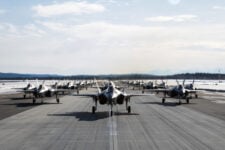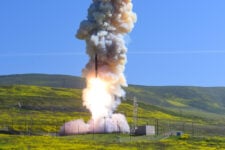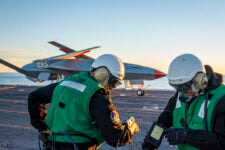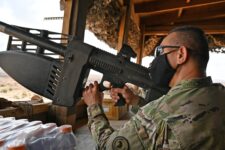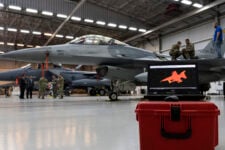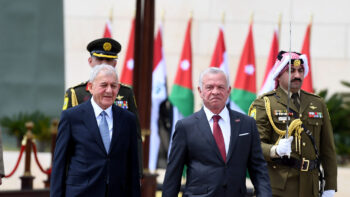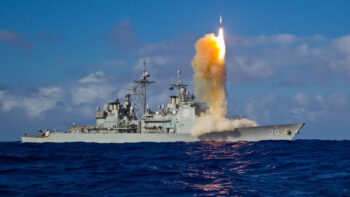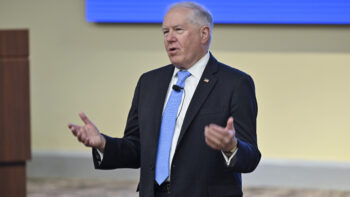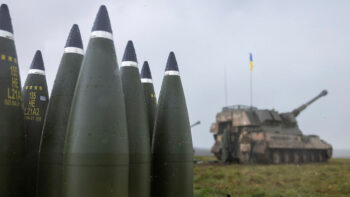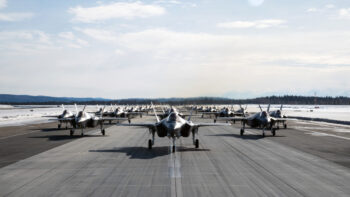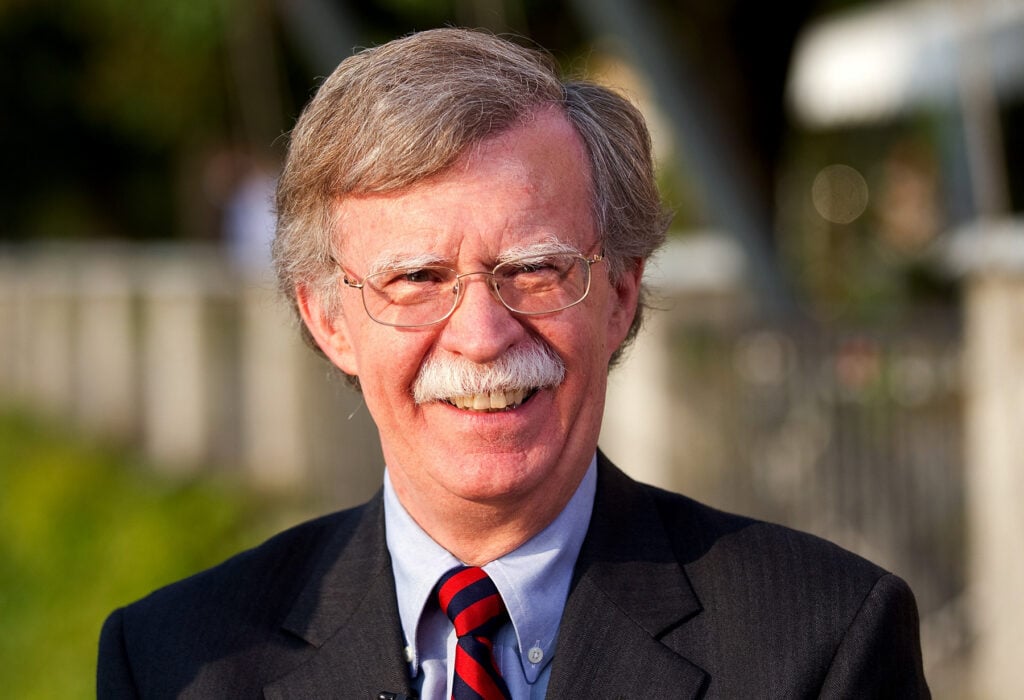
National Security Advisor John Bolton
OMAHA: As the White House edges closer to abandoning the New START treaty, it may be setting Washington on a collision course with NATO allies, including Britain — traditionally the ally that most closely echos US nuclear policies and strategies.
“We do need to maintain our commitment to arms control,” Angus Lapsley, director general of Strategy and International at the UK Ministry of Defence, said today. “A commitment to arms control is critical to maintaining maintaining the cohesion of NATO and help build trust even among rivals.” “We intend to protect … the New START treaty,” he told the Strategic Command’s (STRATCOM) annual conference on deterrence today, carefully noting that “we applaud the US determination to engage with Russia.”
Experts say that Canada, Germany and a number of other NATO allies — to a greater or lesser degree — have made extremely clear their concerns that nothing good would come of New START’s disappearance. In particular, they are concerned about the impact on the mother of all arms control treaties, the 1970 Nuclear Nonproliferation Treaty (NPT). The NPT pledges all signatory countries beside the so called P5 nations — the US, UK, Russia, China, and France — to forgo the development of nuclear weapons, in exchange for promises by the P5 that they eventually will give them up. That treaty, which is up for review next year, already is under considerable pressure from countries such as India — a non-signatory that has developed, along with arch-rival Pakistan, nuclear weapons — and other developing nations who see the P5 as reneging on their vow.
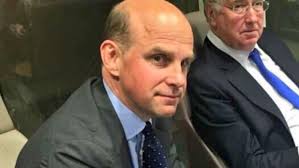
Angus Lapsley, UK MoD
“A commitment to arms control … is critical to maintaining commitment to the NPT,” Lapsley said.
New START, signed in 2010, limits Russia and the US each to no more than 1,550 deployed strategic warheads and 700 deployed strategic delivery vehicles (meaning ICBMs, submarines and bombers). The White House can agree with Russia, without congressional input, to extend it for five more years. However, the Trump Administration has been increasingly signaling that it won’t. Instead, President Donald Trump has ordered his staff to begin work on a possible new trilateral nuclear arms control treaty that would include China — as well as cover sub-strategic weapons and other sorts of nontraditional delivery systems such as hypersonic missiles.
“New START was flawed from the beginning,” National Security Adviser John Bolton told the far-right activist group Young Americans for Freedom on Tuesday. “It is due to expire in February 2021 and while no decision has been made, it is unlikely to be extended. We need to focus on something better. And we will.”
The US-Russia nuclear arms control regime that has been a stabilizing factor in bilateral strategic relations even during the worst freezes of the Cold War is on the verge of collapse. The US is set to withdraw tomorrow from the 1987 Intermediate Nuclear Forces (INF) treaty that barred mid-range nuclear missiles that threatened Europe. President Donald Trump decided to withdraw over Russian violations. (Moscow, for its part, has accused the US of the same.) Thus, New START’s dissolution would mean that there will be no nuclear arms control treaty limiting US and Russian arsenals for the first time in more than 50 years. There are many in the arms control community in the US who believe that is Bolton’s goal.
However, Bolton is not the only voice within the administration on New START — there are those in both DoD and the State Department who support the treaty and believe China may eventually be brought into the arms control discussion.
“When it comes to the New START treaty, from a STRATCOM perspective, we like the idea of arms control agreements, particularly with Russia, that provide us with some level of assurance that at least a portion of their nuclear forces are capped,” Vice Adm. David Kriete, deputy commander of STRATCOM, told reporters here yesterday. “So we kinda know what we have and what we are dealing with, and then we can plan accordingly.”
He added that in addition, New START “has a very, very robust verification regime. Again from a military perspective, at STRATCOM those verification procedures that the US gets to execute all the time provides great insight into Russia’s capabilities, numbers and all kinds of things associated with their nuclear weapons. We want that information flowing. If we were to lose that for any reason in the future we would have to go look for other ways to fill in the gaps for the things we get from those verifications.”
Kriete’s remarks echo similar remarks made in recent months by Gen. John Hyten, current head of STRATCOM and presumptive Vice Chairman of the Joint Chiefs of Staff, after the Senate Armed Services Committee approved the nomination 20 to 7 yesterday.
“We have to think about moves each side might make once their free of those treaty constraints….we can certainly envision scenarios where Russians moves to expand their forces in significant ways,” Paul Bernstein, distinguish research fellow at National Defense University, said. “Depending on how far they take that, it might be something we can live with or adjust to. But at a certain point we might find ourselves having to consider countervailing steps.”
Kriete explained that New START “only caps a portion of the US and Russian nuclear arsenals. The ICBMS, SLBMS and strategic bomber forces.” While he said Russia remains within the treaty’s limits, he explained that it also has “aggressively developed a whole number of nuclear weapons systems that do not fall under the categories that are defined in the New START treaty. … So as a result, they’ve put their country on a clear trajectory to increase the total number of nuclear weapons that they have available to them, the number and types of delivery systems through which they might employ them. And then potentially most important is an emphasis in their military doctrine on nuclear weapons that we previously hadn’t seen since the end of the Cold War.”
Obviously, that makes US national security officials uncomfortable. Thus, Kriete said, the goal of the 2018 Nuclear Posture Review is to “make sure that at no point in the future does Russia, or any other potential adversary for that matter, will ever get to a point where they perceive they may possess some type of strategic advantage that would give them a window or an opening or convince their leaders that it might be OK to use nuclear weapons in some sort of conflict.
“After all our goal is to deter all nuclear weapons,” he added. “I do believe that the New START treaty helps us do that. But if we get to a point where we can find a way to capture all the other things that are going on outside the treaty, we’ll actually do better.”
Retired Lt. Gen. Frank Klotz, who commanded Air Force Global Strike Command and served in the Obama Administration as the Energy Department’s undersecretary for Nuclear Security, told the Mitchell Institute for Aerospace Studies on July 11 that letting New START expire would likely increase the costs of the US nuclear modernization effort. “One of the things that concerns [US military leaders] is: without these constraints, what would the costs be and how viable would this modernization program that we so carefully laid out be?” he said.
Jordan walks careful line after shooting down Iranian strikes headed to Israel
Amid Iranian criticisim, “Jordanian leaders have been very clear to portray their action as defensive and in protection of their own sovereignty rather than any act in support of Israel, and this is sincere,” an analyst told Breaking Defense.





